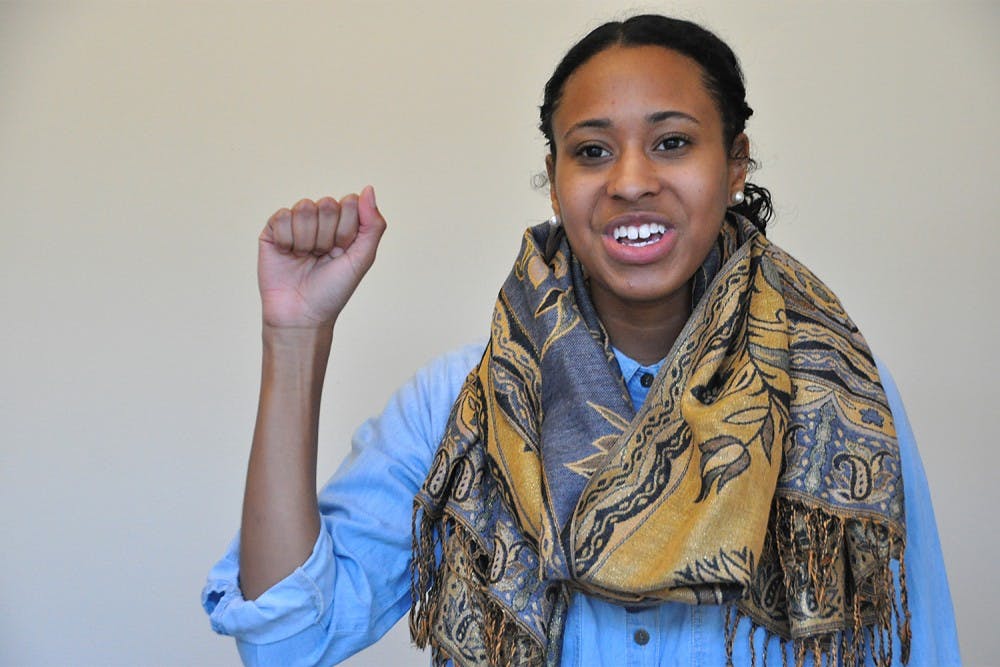She said writing about difficult issues can be hard, but it can also serve as an emotional release.
“My grandmother passed away my freshman year, so as a way to, you know, release some stress or some heartache from that situation, I write about it,” Cox said. “It makes me feel a lot better. And I can speak to my grandmother through my poetry, and I can speak about her to, you know, keep her alive through performing.”
A writing process for the poetic craft
For UNC sophomore Christian Prosperi, the process of writing spoken word poems begins with an idea.
That idea is then carefully crafted into a handwritten poem before being edited several times on the computer, ensuring the final product is a piece that rolls off the tongue and can be easily read aloud.
Prosperi said the ease of the writing process depends on the subject matter of the poem and whether it’s an idea that came to him or a topic he has been asked to write about.
Usually, it takes a week — at minimum — to complete a poem, but Prosperi, a member of UNC Wordsmiths, said he has spent up to a month or two working on a single poem.
“You go through several drafts to get a form that you’re comfortable with performing,” said Prosperi, who said he usually writes two to four drafts before reaching a final product he is happy with.
Prosperi, a biology major, has been doing slam poetry since his freshman year of high school and has been slamming with the Wordsmiths since he came to UNC. He was a member of the 2014 Wordsmiths’ College Unions Poetry Slam Invitational team.
“It’s a little bit like writing a persuasive essay,” Prosperi said. “You’re trying to get your point across, so you’re making sure that your strongest points are hitting with the most force nearer to the end of the poem, sort of like a climax type of thing.”
To get the day's news and headlines in your inbox each morning, sign up for our email newsletters.
The length of the poem can differ based on each writer’s style, but for the Wordsmiths, all poems must be under the established three minute maximum when read aloud.
Prosperi’s poems are usually two to three pages long, but he said he is a fast talker and that some writers’ works can be as short as a page, depending on talking speed and line length.
Perfecting the volume and voice
Just as important as their words are the poets’ gestures and the tone and volume of their voices.
Sumeet Patwardhan, a political science major and the artistic director for EROT, explained the process of perfecting his voice.
He said he starts by reading the piece out loud to himself, whispering it and gesturing with his hands.
“Luckily, I’m pretty all right at memorizing poems,” he said. “It takes me probably a week to get a poem down perfectly, like the way I want it. The shortest time I’ve been able to memorize a poem is a day and a half.”
Once the poem is memorized, Patwardhan practices it standing up, at full volume. He said it’s common for poets to practice different parts of the poem in different voices and volumes to see which will sound best.
After memorizing and finding the right voice, he focuses on adding a visual aspect to the performance with hand movements and gestures.
“It helps bring more variety to the performance,” Patwardhan said.
Patwardhan often practices performing the poem in front of windows, so he can see his reflection, or with his computer recording a video of him.
“I record myself to see how it looks and sounds,” Patwardhan said. “I perform for friends — people who aren’t poets — to see what someone else would think.”
A big part of the process of perfecting the voice is performing the poem in front of a team member who will then give feedback, such as ideas for gestures, he said.
This happens in two ways — either the teammate gives feedback after the poem is recited or, more often, the team member stops the poet halfway through to give immediate advice before allowing him to proceed with his art.



